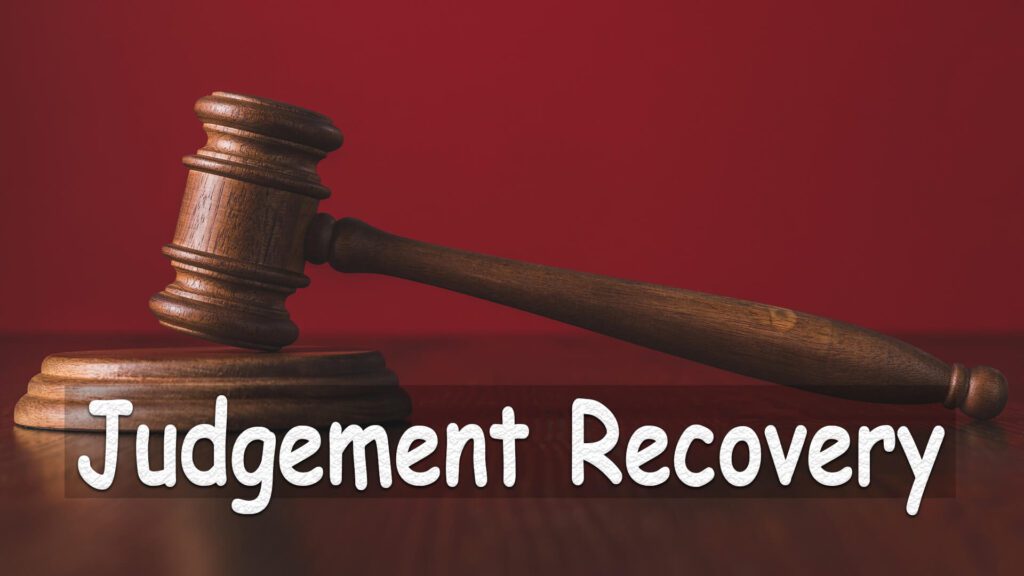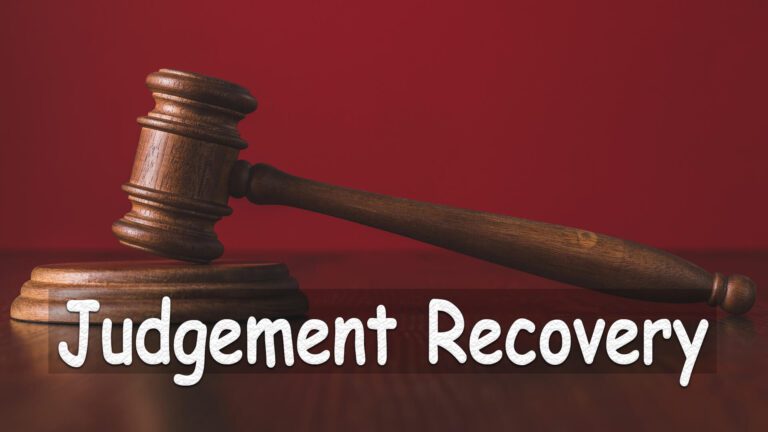Introduction:
Judgement recovery is an operation of collecting money from debtors who are commanded by a court to pay a creditor.
In a few cases, the person or debtor who is called to pay creditors disappears, refuses, or hides his assets to avoid payment. The creditors, to whom money is debt, may not be able to get his money completely, depending on the case position. A private detective who has judgement recovery experience can reveal all hidden money and assets of the debtor. It will help them to recover payable money in any circumstances.
What is a Writ of Execution?
A writ of execution is a court order which is released by the court for the execution of a judgment. Every case order is obtained by a lawyer who will follow the case process under all legal terms and conditions.

If anyone wants to issue a writ of execution, the court commands a court officer or sheriff to take a record of assets that are the property of the debtor. All these properties and assets are sold in an auction or sheriff’s sale once the court lays hold of them, and this amount is used to pay off the debts to creditors.
What to Do If Debtor Refuses to Pay Debts?
If the judge awarded the final judgment in court, then the debtor has to pay all debts to the creditor. In this case, the only exception is if they prove that they have no or fewer funds or assets to pay debt and win an appeal in court. The creditor can use various techniques and methods to recover his money.
These methods include the forced sale of assets to collect money, freezing bank accounts, clearance, claiming property, and many more. A private investigator can help you to collect the necessary information to make you able to appeal in court. They are experts in techniques to find and locate missing persons or property.
What assets information a private investigator looks for?
A private investigator looks for the following assets to appeal in court against the debtor to pay debts.
- Bank Accounts and their details
- Real Estate
- Wages
- Cars, motorcycles, boats, etc.
- Business details and income
- Security Deposits
- Income from rents
- Bonds and funds
- Income from other sources
Important Things to Know to Win a Judgment Recovery Case:
Many people don’t understand that judgment recovery is just an official court order that states that a debt is owed to the creditor law. In fact, in these cases, the court is not responsible for collecting owed money and paying the creditor. The courts can only issue official notice and demand that the debtor (company or people) pays you, but can’t physically force them to pay owed money to creditors.
About hundreds of recovery notices are issued daily all over the country, but almost 80% of them are never collected. The creditor has ten years to collect his debt once the judgment is issued. After that, he has to renew the judgment. You can collect interest over your debt, but the more you delay collecting debt, the more difficult it becomes.
Collecting or Reclaim Judgment Assets or Money:
If you win a judgment case in court, it doesn’t mean that you will get money on the spot. The law creditor is responsible for enforcing and collecting debts according to the law system. A law creditor is a person who wins the judgment case.
The creditor has ten years to collect his debt money, but this judgment can be renewed if needed. Recent studies reveal that about 80% of debt judgments are not implemented, which means they are never collected.
Methods to Recover Judgment Debtor Money:
If the debtor refuses to pay money, you can use other methods to collect your judgment money. The creditor can use additional judgments, attorney or other legal ways to collect money. These methods may be freezing bank accounts or property, claim property, wages, etc. Before creditors start debt collection, they should understand it can be dangerous in many cases. When you head to collect owed a debt or money, physically make sure to get help from enforcement.
1. Financial Uncovering:
Many states allow the creditor to start “Post-Judgment” to accelerate the debt judgment recovery process. In this process, the creditors can request financial and property documents from the debtor. The main purpose of this post-judgment process is to get an idea of the financial state and condition of the debtor.
2. Garnish Debtor’s Bank Accounts and Wages:
In many states, creditors can garnish 25%, wages of the debtor. For this, he needs to appear in another court hearing to get approval for his appeal. During this hearing, the creditor has to present all information again to prove that you owe money from the debtor. Additionally, the debtor can also garnish the debtor’s bank account.
Get Help from Judgment Recovery Expert:
Various companies and organizations offer judgment recovery services. These judgment recovery services are offered by private investigators, agencies, collection attorneys and officers, and others. Specialized judgment recoveries experience in many methods to collect owed money and debt. Such as
- Full payment collection to stop further legal action against them
- Setting up of payments plan to collect complete payment over time
- Garnishment of debt’s wages, bank accounts, or any other income source
- Claiming debt’s property, vehicles, etc.
- Developing lean on the debtor’s property
- Occupy other financial sources like bonds, funds, rental income, etc.
You can find many judgment recovery companies and organizations online by simply searching judgment recovery sites. You can visit their products and services from their sites and can choose the best suitable organization for you. Before hiring, you should check for their references and their business service ratings.
Final Verdict:
A court issues a recovery judgment notice in order of case in court. Usually, these judgment debts are in the form of money, but the creditor can collect in the form of real estate, property, and other forms of income.
You can get help from private investigators to locate unrevealed assets like hidden property, real estate, bank accounts, vehicles, bonds, etc. Creditors can also claim other income sources of debtors.
Frequently Asked Questions (FAQs):
Can the judgment recovery order be expired?
Money judgment automatically runs out after ten years of judgment. If the creditor does not renew it after its expiration, the debtor has to pay no longer any amount. Once creditors renew the judgment, it can last for more than five years.
Is judgment recovery a rewarding business?
It depends on the effort of people who do recovery business. Many people make a good amount of learning the enforcement of the law for years and practicing it. Hard-Working people can make a good living with judgment recovery business by simply making an effort in this field.
How much time does judgment recovery notice last?
Judgment recovery court notice, once issued, can last for ten years. After this time, the creditor has to reappear in court for renewing the recovery notice. After extending the recovery notice, it lasts for five more years.


